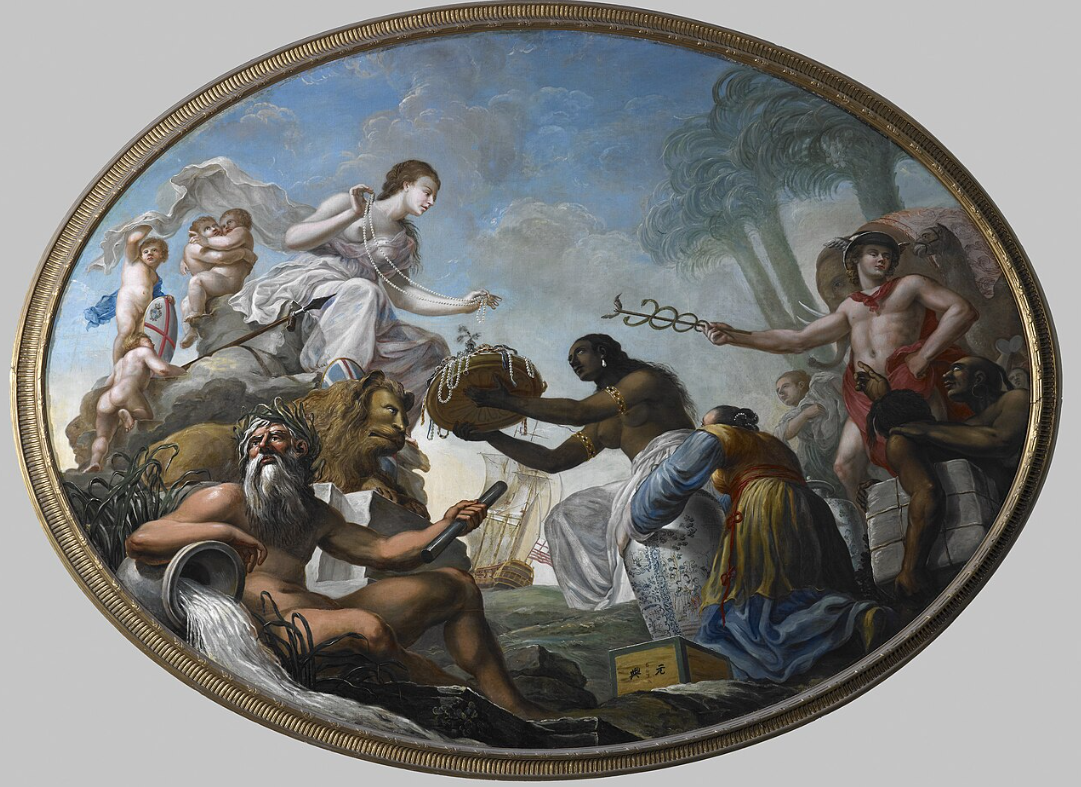Webmaster Notes
The Raymond Family and the East India Company - Colonel Valentine Blacker - Tipu Sultan - Siege of Seringapatam (1799)
The East India Company
It would not be too much of a stretch of imagination to conclude that the East India Company would have
some part to play in the History of Belchamp Walter.
The company was founded in the 17th century and by the
18th century accounted for a major part of the world's trade. The influence that the EIC had on Belchamp Walter's history may have been significant. Certainly, those that had the region under their control would have had some dealings with the company.
Wikipedia describe the EIC:
"
The East India Company (EIC) was an English, and later British, joint-stock company founded in
1600.
"
In fact the EIC was founded on the last day of the 16th Century.
This could be debated as what year in the first in
a century? The EIC was founded 31 Dec 1600.
Top
Coincidence?
Sir Charles Valentine Raymond -
Valentines Mansion
Valentines Mansion was built in 1696 for Lady Tillotson, the widow of John Tillotson, Archbishop of Canterbury.
[HE 1][7][8]
For twenty years until around 1780 it was the family home of Sir Charles Raymond who had considerable
interests in the East India Company as a ship owner and later became a banker.
The house remained a family house until Sarah Ingleby, its last inhabitant, died on 3 January 1906.
Following the death of the mansion's owner the local council acquired the remainder of its grounds
and expanded the park.[9][6]
It is now a Grade II listed building
Carnatic Wars - 1746 1763 - from The Anarchy: The Relentless Rise of the
East India Company
William Dalrymple mentions these wars. Robert Clive, Clive of India, consolidated his fortunes in these.
An exerpt from the Introduction:
"
One of the very first Indian words to enter the English language was the Hindustani slang for plunder: loot.
According to the Oxford English Dictionary, this word was rarely heard outside the plains of north India until
the late eighteenth century, when it suddenly became a common term across Britain.
"
"
To understand how and why it took root and flourished in so distant a landscape, one need only visit Powis Castle
in the Welsh Marches. The last hereditary Welsh prince, the memorably named Owain Gruffydd ap Gwenwynwyn, built
Powis Castle as a craggy fort in the thirteenth century; the estate was his reward for abandoning Wales to the
rule of the English monarchy. But its most spectacular treasures date from a much later period of English conquest
and appropriation. For Powis is simply awash with loot from India, room after room of imperial plunder, extracted by
the East India Company (EIC) in the eighteenth century. There are more Mughal artefacts stacked in this private
house in the
Welsh countryside than are on display in any one place in India – even the National Museum in Delhi.
"
A mention of George Washington and the Plains (Heights) of Abraham
Reading William Dalrymple's The Anarchy I came across this reference:
"
That opportunity manifested itself even as the Carnatic Wars were grinding to an inconclusive end in the mid-1750s.
For it was not just in India that Anglo-French rivalry was smouldering, ready to reignite at the slightest spark.
Instead the trail of gunpowder which ignited the next round of Anglo-French conflict began far away from India,
on the frozen borderlands of America and New France – what we today call Canada – between the great lakes and the
headwaters of the Ohio River.
On 21 June 1752, a party of French Indians led by the French adventurer Charles Langlade, who had a Huron wife
and was also influential among the Seneca, Iroquois and Micmac, led a war party of 240 warriors down Lake Huron,
across Lake Erie and into the newly settled farmlands of British Ohio. Tomahawks at the ready, they fell on the
British settlement of Pickawillany, achieving complete surprise.
Only twenty British settlers managed to muster at the stockade. Of those, one was later scalped and another
ceremonially boiled and the most delicious parts of his body eaten.
The violent raid spread a sense of instability and even terror among British traders and settlers as far as New York
and Virginia. Within months, regular French troops, supported by indigenous guides, auxiliaries and large numbers
of Indian warriors were rumoured to be moving in large numbers into the headwaters of the Ohio Valley, and on
1 November the Governor of Virginia sent a 21-year-old militia volunteer north to investigate.
His name was George Washington. So began the first act in what Americans still call the French and Indian Wars,
and which is known in the rest of the world as the Seven Years War.162 This time it would be total war,
and properly global, fought on multiple continents and in ruthless advancement of worldwide British and French
imperial interests. It would carry European arms and warfare from the Ohio to the Philippines, from Cuba to the coast of Nigeria, and from the Heights of Abraham outside Quebec to the marshy flatlands and mango groves of Plassey.
But the part of the globe it would transform most lastingly was India."
I am not sure if I can link this back to George Washington Brownlow
(Belchamp Walter) and/or the Virginia Company (Sir William Harris).
